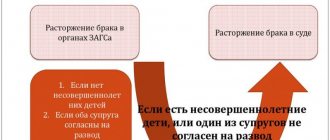From the point of view of the law, divorces in the presence of two or more minor children are not much different from the dissolution of a marriage with one minor child. The decision on such divorce proceedings is usually made by the court, except in cases where the spouse is:
- Those sentenced to imprisonment in a colony for a period of more than three years.
- Incompetent according to a court decision.
- Unaccounted for by court order.
In these exceptional cases, the husband and wife are divorced through the registry office, regardless of whether they had a child during the marriage or not.
How does the procedure for terminating a marital relationship with two children differ from a similar procedure when a married couple has only one child? The following nuances can be highlighted:
- The judge will decide the issue of determining the place of residence of each child separately, guided by the agreement of the parents, if it was concluded, the norms of family law and the interests of the child.
- The judge makes a decision for each minor on the procedure for meetings and communication with a parent who does not live with the children in the same territory.
- A parent to whom the court gives young children to raise and live together with them may claim an increased share of the total marital property. For example, in practice, sometimes this is expressed in the fact that the court can give such a spouse not half of the apartment, but two-thirds.
- When spouses have several children, during a divorce it becomes necessary to determine the amount of alimony for each child. This amount is prescribed by the parents themselves in the child support agreement or set by the judge.
The procedure for divorce through the court in the presence of two or more children
Any divorce process before the start of the actual proceedings goes through 2 stages:
- Determining the type of court that has the right to hear the case.
- Drawing up and filing a claim.
To determine the court competent to hear a divorce case, you should use the information in the table.
| Vessel type | Categories of divorce cases |
| World judge | Any family disputes except:
|
| District Court | All family disputes not within the jurisdiction of the magistrate and referred to in paragraphs 1 and 2 above. |
After this, the issue of jurisdiction should be resolved, i.e. in which locality or area of the locality the claim should be filed.
| Jurisdiction criteria | A comment |
| Location of the defendant | The law states that this rule applies by default. |
| Plaintiff's location | If, before filing a claim, one of the spouses took the children into their custody, then he (she) can initiate legal proceedings with the other spouse at his place of residence. |
| According to the agreement of the spouses | By marital agreement, a divorce case can be considered in any court located on the territory of the Russian Federation. |
Next, the spouse interested in divorce needs to find or prepare documents that will be submitted along with the statement of claim, and make copies according to the number of participants in the divorce case. A separate copy of each document is prepared for the judge.
The next step is for the interested spouse to prepare a statement of claim. It consists of three parts:
- A header in which the applicant indicates the details of the court, for example, its name and address, as well as information about the plaintiff and defendant (full name, residential address, e-mail, telephone number).
- Descriptive part. It indicates: Information about the marital status of the spouses, for example, the time of entry into the marital relationship, details of the marriage certificate.
- Information about each child born in a marital relationship: full name, age, details of the birth certificate.
- Circumstances that served as the reason for separation, for example, betrayal of a spouse, differences in character and outlook on life, alcoholism of the defendant, etc.
- Evidence of the circumstances that forced the plaintiff to divorce the defendant.
- Information about the position of the defendant in the dispute, for example, about his consent or refusal to divorce.
- Information about agreements that were concluded between spouses, for example, on the division of property, on alimony, on the procedure for communicating with young children.
- References to the provisions of Russian laws with which the plaintiff supports his words.
- Applicant's requirements.
As samples that will help you write a claim yourself, you can look at this statement or this or this.
Then you need to pay a fee for considering the divorce case in court. Details of the account to which you need to transfer money can be obtained at the court reception or viewed on the court’s website.
If the case is accepted for proceedings, the judge sets a date for a preliminary hearing, during which the position of each spouse is clarified. This is necessary so that the judge can decide whether it is advisable or inappropriate to provide time for reconciliation between the wife and husband:
- If the defendant is against the divorce, the judge may postpone the decision for a period of time from one to three months. This time is allocated for reconciliation of the parties. However, spouses, by mutual motion, may refuse reconciliation and demand an immediate hearing of the case.
- If the parties agree to separate, then the court is bound by only one rule of law, namely: the judge can make a decision on divorce only after 1 month has passed from the day when the husband and wife submitted a joint application to the court to terminate the marriage.
At the next meeting, when the judge finds out that reconciliation has not taken place and the spouses firmly intend to divorce, the trial on the merits begins. It addresses the following questions:
- Division of common assets of spouses, as well as their debts
- Child support for minors if the parents have not signed a child support agreement.
- Determining the place of residence of young children if the parents have not entered into an appropriate agreement.
The divorce is considered to have taken place at the moment when the court decision receives legal force, i.e. 1 month from the date of drawing up the final judicial act. If any party does not agree with the decision, then during this month it can be appealed by filing an appeal with the appropriate court. For a magistrate's court, this is a district court, and for a district court, it is a regional and other court equivalent to it.
Features of divorce with two minor children
Having children does not stop their parents from ending their marriage. Further cohabitation may be impossible. In this case, the divorce process will be more complicated. The tasks of government bodies include monitoring compliance with children's rights.
According to paragraph 1 of Art. 21 of the RF IC, an application for divorce must be filed in court regardless of whether there is a dispute between the parents regarding the children.
The nuances of divorce if there are two children:
- The judge needs to determine the future place of residence of the children. For these purposes, legal norms and the interests of the child are taken into account. If the spouses are ready to draw up a settlement agreement, they will have to rely on it.
- As part of the judicial process, the amount of child support for each child is determined. The amount can be set by both the parents and the judge.
- Particular attention is paid to determining the order of meetings and communication between children and a parent who will not live in the same area with them.
- The spouse who has taken upon himself the responsibility to support the children can claim a large part of the jointly acquired property.
What to do if the plaintiff does not appear in court
The plaintiff is a party to the process directly interested in resolving the case in his favor. The activity of the plaintiff can be expressed not only in his presence at each meeting and defending his own position at it, but also in the ability to competently draw up a claim and ask for a decision to be made on it in his absence. At the same time, there are situations when the plaintiff sends an application to the judge and subsequently does not take any actions indicating his intention to seek a resolution of the dispute in his favor. These situations are discussed in the table below.
| Legal fact | A comment |
| The court has no information about the plaintiff's notice | The meeting must be adjourned. |
| The judge admitted that the reasons why the plaintiff could not come to the meeting were valid. | The meeting must be adjourned. |
| The plaintiff was twice notified of the time and place of the hearing, failed to appear at it twice, and did not apply for consideration of the divorce case without his presence. The defendant does not require that the claim be considered on its merits. | The judge leaves the claim without consideration, and the divorce process ends there. Thus, the defendant and plaintiff remain legally married. |
| The plaintiff was twice notified of the time and place of the hearing, failed to appear at it twice, and did not apply for consideration of the divorce case without his presence. The defendant demands that the claim be considered on its merits. | The case is resolved in accordance with the rules of absentee proceedings. The judge makes a decision to end the marriage relationship. |
How to get a divorce if you have two children
The mechanism and duration of the divorce process for spouses with two minor children will depend on the consent or disagreement of the spouse with the severance of the marriage.
Another key factor is the age of the minor children. If the family has a child under the age of 1 year, then the restrictions provided for in Art. 17 RF IC.
According to the provisions of this article, the husband does not have the right to demand divorce without the consent of his wife if there is a child under the age of one year.
Note: The registration authority, even in the case of divorce through the court, is the registry office, which must issue the spouses a certificate of divorce based on a court decision.
Basic principles of property division
Property relations of spouses in the event of termination of marriage can be regulated by a marriage contract or by law.
The provisions of a prenuptial agreement are generally accepted unconditionally by the court unless its terms place either spouse at a severe disadvantage. An unfavorable situation means, for example, the following situation: according to the contract, all property purchased during marriage is transferred to the husband in the event of divorce. This condition clearly infringes on the interests of the wife, so the court almost completely recognizes it as invalid.
In addition, it should be taken into account that, according to a prenuptial agreement, during a divorce, both property purchased during the marriage and the personal belongings of each spouse can be divided. The only important thing is that the relevant provision is spelled out in the contract.
If the spouses did not enter into a marriage contract, then the division of property values occurs according to the norms enshrined in the Family Code. The division of property is based on the concepts of “joint property” and “personal property”.
Personal property cannot be divided. This includes:
- Shoes, cosmetics, toothbrushes, razors, clothing and other personal items, except luxury items and precious items.
- Assets owned by a spouse before the marriage began.
- Items that have become the property of a spouse under any gratuitous agreements and transactions, including those inherited.
Joint property is considered to be things that became the property of one or both spouses during marriage. These include:
- Salaries and other income, as well as profits from a business or investment.
- Stocks, bonds and other securities.
- Pensions and benefits.
- Shares in the capital of legal entities or credit institutions.
- Bank deposits.
- Any immovable or movable things.
- Shares in mutual funds or housing cooperatives.
- Money and other benefits received from intellectual activity.
In addition, two important nuances should be taken into account:
- A spouse who cared for young children or took care of the household during the marriage and did not contribute to the family budget has the right to part of the assets upon division.
- If a spouse has invested his money or labor into the personal asset of the other spouse and thereby significantly increased the value of this asset, then the judge has the right to recognize it as joint property.
Joint property can be divided between the wife and husband according to a notarized agreement between them. If it is missing, then the judge makes the division in accordance with the following principles:
- All assets are divided 50/50 between the spouses. The exception is cases when the judge has the right to transfer an increased share to one of the spouses, bearing in mind the interests of minor children or the immoral behavior of another participant in the marriage, who squandered family money or did not want to earn it due to unjustifiable reasons, for example, laziness, alcoholism, frivolous attitude towards life.
- Debts are divided according to the shares of the awarded assets.
- Children's property cannot be the subject of division.
- If the value of the things that were transferred to one of the participants in the marriage is higher than the value of his share, then the court obliges him (her) to transfer compensation to the other spouse, for example, in money or other property.
For what reasons does the court choose one of the parties?
Despite judicial practice in the preference for children to live with their parents, no one takes away his rights from the father. The Family Code has established equal status and obligations between them, so a man can file a lawsuit and sue the kids. To do this, you must provide evidence:
- addiction to alcohol and drugs;
- inappropriate care;
- neglect of medical care;
- physical violence;
- malicious evasion of maternal responsibilities.
If the facts are confirmed by witness testimony and administrative penalties based on the above examples, the court will satisfy the father’s claim.
List of documents for filing a claim
Keep in mind that the number of copies of documents must correspond to the number of participants in the process + 1 copy of all documents for the court. Along with the claim, the applicant must submit:
- Marriage certificate.
- A document confirming the transfer of duties in favor of the state.
- Birth certificates for each child.
- Agreements with the spouse, if they were drawn up and signed (on alimony, on children, on division of property).
Additional documents that the applicant may submit to the court in order to substantiate his demands for the transfer of children to him include:
- Information about earnings, for example, a tax return or a 2-NDFL certificate.
- Documents for residential real estate, for example, a certificate of ownership.
- An agreement on the exercise of parental rights drawn up by the spouses.
- Information about work schedule.
- Characteristics of colleagues, neighbors, employer.
- A certificate confirming the absence of registration in a drug treatment or psychiatric dispensary, as well as the absence of a criminal record.
- Receipts confirming the purchase of things necessary for children.
Alimony
Upon divorce, the spouse with whom minor children remain to live has the right to demand the recovery of monetary maintenance - alimony in their favor.
The law establishes fixed amounts of alimony when it is withheld from all types of income of the payer. Alimony for two minor children will amount to 1/3 of all types of income. After one child reaches the age of majority, alimony will be recalculated at the rate of ¼ of the payer’s income.
The amount of alimony can be determined by the spouses within the framework of an agreement signed by both parents, which may also determine other conditions for the maintenance or upbringing of children.
If one of the children who was left behind during the divorce from the mother is under three years old, then she may demand payment of alimony not only for the child, but also for her own maintenance. Child support for the mother is collected only in the form of a fixed amount.
State duty amount
Resolving a divorce case will cost the applicant 600 rubles. Alimony disputes are considered free of charge, however, if the plaintiff makes claims against an improper defendant, he will be obliged to transfer 150 rubles to the state treasury. The defendant pays a similar amount if he loses the alimony case.
If during a divorce the spouses divide joint assets, then the plaintiff must pay a separate fee for resolving such a case. The procedure for its calculation is indicated in the table.
| The value of the plaintiff's claims | Calculation formula |
| Less than 20 thousand rubles. | Four percent of the amount of the stated claims, but not less than 400 rubles. |
| 20 thousand 1 rub. – 100 thousand rubles. | Three percent of the amount of declared claims above 20 thousand rubles, to which 800 rubles are added. |
| 100 thousand 1 rub. – 200 thousand rubles. | Two percent of the amount of declared claims above 100 thousand rubles, to which 3,200 rubles are added. |
| 200 thousand 1 rub. – 1 million rubles. | One percent of the amount of declared claims above 200 thousand rubles, to which 5,200 rubles are added. |
| Above 1 million rubles. | Half a percent of the amount of declared claims above 1 million rubles, to which 13,200 rubles are added, but not more than 60 thousand rubles. |
Do you need help
Depression always sets in after a divorce. This is understandable. Previously, he brought money home, and you spent it on the needs of the family. Now this won't happen. If your ex is a decent person, you will receive alimony. But money can spoil even the best person. Previously, you had support and support. Now she's gone. There is no need for unnecessary hysterics, but calling and whining to your friends is not weakness.
And it’s better not to even call and cry into the phone. It’s better to invite old friends over or go somewhere. Why do you need friends at all? And don’t forget – it’s only the first few months that are difficult , then life either gets better or goes completely down the drain. If you switch to new acquaintances, the likelihood of following the first path increases noticeably.
If you take the second path, run to a psychologist. There is no need to be afraid of them. It would be better to even find yourself a scarier shrink. Let him rummage around in your head, find the source of the problem and tear it out by the roots. Don't save money. There is no need to go to fortune tellers, psychics and other charlatans. Your solution is a psychologist with good practice.
Arbitrage practice
The case was considered by the Yagodninsky District Court of the Magadan Region in May 2017.
The husband first turned to the magistrate of one of the judicial districts of the Yagodninsky district with a demand for a divorce. During the meeting, he petitioned to determine the place of residence of his young children and motivated his claims by the fact that his wife was cheating on him and did not fulfill maternal responsibilities. Due to the fact that such cases cannot be heard by a magistrate, the case was sent to the district court.
The plaintiff was absent from the district court hearing because he applied for resolution of the claim without his presence; in the statement of claim he insisted on terminating the marriage with his wife, but refused the demands regarding the children.
The defendant indicated at the meeting that she agreed to divorce her husband. In April 2021, according to her, she is going to move to an apartment purchased with maternity capital, and will take her children with her, as she and her husband agreed on. There was no alimony agreement concluded between them.
Having examined the materials presented by the parties in the case, the court decided:
- The plaintiff refused to demand to determine the place of residence of his minor children, so the proceedings on this demand are terminated.
- The court has evidence that both spouses agree to divorce and insist on it. Therefore, the court sees no reason to refuse divorce.
- Since the wife and husband determined by their own agreement that their minor offspring will remain with their mother and the guardianship authority agrees with this, the court, without information about the circumstances that violate the interests of the minors, approves the agreement of the spouses.
- Collect alimony for two children from the plaintiff, equal to 1/3 of his monthly income.
Who will the children stay with after the divorce of the spouses?
How a divorce occurs with two children largely depends on intra-family relationships. Former spouses may have a dispute regarding who the children will stay with. The final decision is made by the judicial authority. This takes into account the moral character of the parents and the living conditions they can provide. In most cases, the court rules in favor of minor children living with their mother.
Children can be left with the father in cases where the mother:
- avoids fulfilling parental responsibilities;
- has a drug or alcohol addiction;
- uses violence against a child.
Among other things, the mother has the right to voluntarily refuse to live with the children. In this case, a mutual agreement is concluded between the former spouses. Additionally, the court determines the order of meetings between the separated parent and the children.
Parents can agree on the separation of children: one child remains with the mother, the other with the father. It is often practiced for children to live alternately with each parent. To avoid disputes, all details are discussed when concluding a formal agreement.
Divorce in the presence of two minor children is carried out taking into account their interests. The procedure requires strict compliance with the legislation of the Russian Federation. The divorce process will be carried out in court. First of all, judges determine the place of residence of the children and assign alimony, taking into account all the stated circumstances.
Regulatory framework
| Legislative acts | List of articles |
| Family code | Article 17 establishes the legal privilege for a wife to refuse a divorce to her husband. Article 22 – features of divorces where the spouse does not consent. Article 23 – features of divorces with mutual consent of the spouses. Article 24 is a list of issues decided by the judge during the divorce process. Article 25 is the moment from which the divorce is considered accomplished. Article 34 is a list of assets considered joint for spouses. Article 36 is a list of things considered personal property. Article 38 – basic principles for the division of marital property. Article 39 – the rules according to which the size of shares is determined. Article 42 is the subject of regulation of the marriage contract. Article 44 – annulment of the marriage contract. |
| Civil Procedure Code | Article 23 – categories of cases referred by law to the competence of magistrates. Article 24 – categories of cases referred by law to the competence of district courts. Article 28 – the rule on filing claims at the location of the defendant. Article 29 – rules on filing claims at the location of the plaintiff. Article 32 – rules on contractual jurisdiction. Article 131 – the content of the application submitted to the court for the purpose of initiating a claim. Article 132 – documents submitted to the court as attachments to the claim. Article 167 – consequences for a plaintiff who fails to appear at the hearing. Article 222 is the rule on leaving a claim without consideration if the plaintiff fails to come to court twice. |
| Tax Code (Part 2) | Article 333.19 – amounts of court fees. |
Cost of divorce with two minor children
The cost of a divorce with two small children depends on additional circumstances of the procedure. The state duty is paid at a bank or payment terminal. A receipt for payment must be attached to the general package of documents.
The amount of the state duty depends on the following factors:
- when collecting alimony - 150 rubles;
- registration of divorce through the registry office in the presence of a court decision - 650 rubles;
- filing documents with the magistrates or district court – 650 rubles;
- unilateral divorce through the registry office - 350 rubles;
- collection of alimony for own maintenance - 150 rubles.









